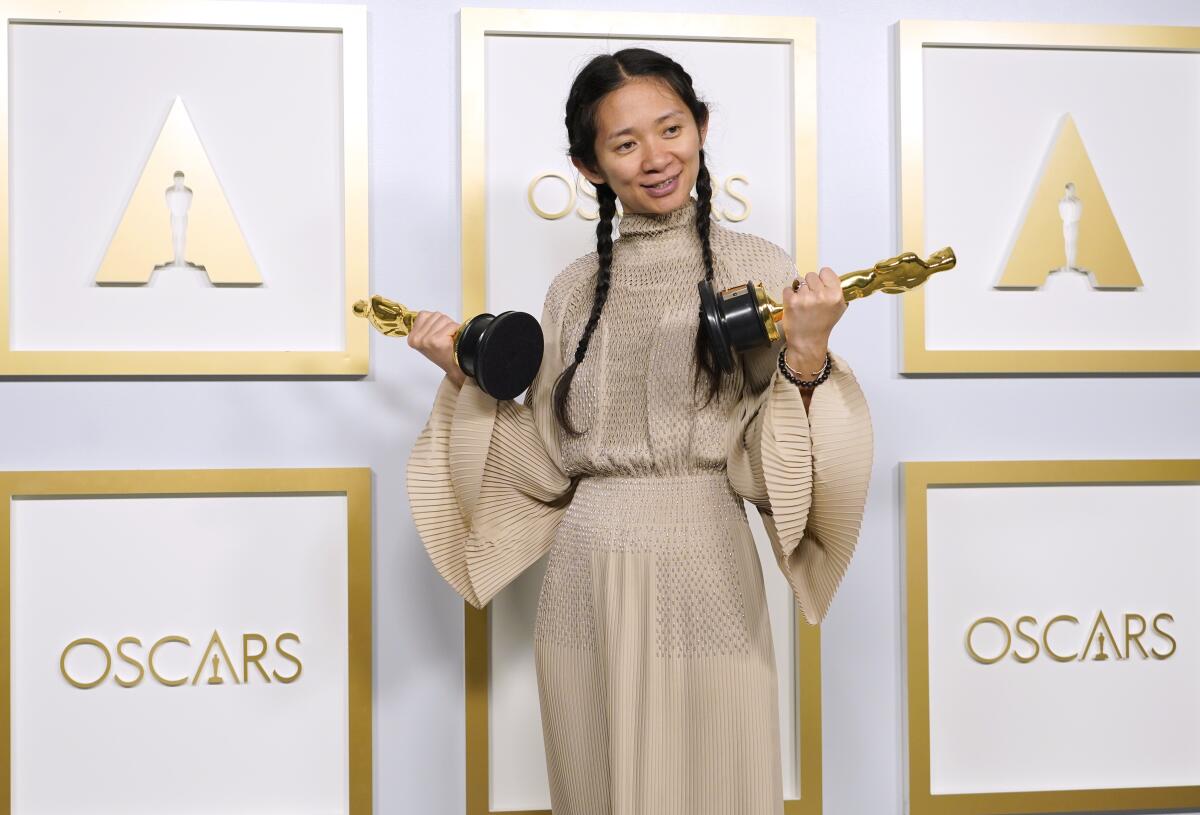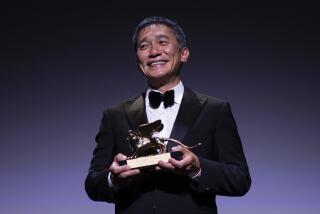China, once eager to score an Oscar, censors news of Chloé Zhao’s double win

TAIPEI, Taiwan — Chloé Zhao’s history-making Oscar wins, for best director and best picture, are being met with a muted response in her country of birth, and even censorship.
Zhao’s “Nomadland” is the second film directed by a woman to win a best picture Oscar. She is the first woman of color and the second woman ever to win the Oscar for best director.
But in China, where Zhao was born and where people in the film industry have often spoken of their ambition to win an Oscar, her history-making success has not been trumpeted or celebrated. State media in China remained silent as of Monday afternoon, with no mention of her wins by either CCTV or the Xinhua News Agency, the two main state-run outlets.
Instead, there was even censorship. A post announcing Zhao’s directing win by film magazine Watch Movies, which has more than 14 million followers on the Weibo microblog, was censored a few hours after it appeared Monday morning. A hashtag called “Chloé Zhao wins Best Director” was also censored on the platform, with users coming across an error message saying: “According to relevant laws and regulations and policies, the page is not found.”
Some users resorting to using “zt” to post about Zhao, using the initials of her full name in Chinese, Zhao Ting. Typing in Zhao’s name in Chinese on Weibo brought up only unrelated posts from the beginning of April. A search for “Oscars” showed only official posts from the South Korean and U.S. embassies.
Douban, an app popular with film buffs, banned searches for “Nomadland” and “Zhao Ting.” Multiple discussion threads about Zhao’s win were deleted on the app as well. A news article on WeChat, the largest messaging app in the country, was also deleted.
With her directing win for “Nomadland,” Chloé Zhao is in the Oscar history books as one of cinema’s great boundary breakers.
Still, individual web users and bloggers found ways to cheer Zhao and spread news of her achievement. Many took note of her acceptance speech, in which she quoted a line from a poem written in the 13th century that she, like many other Chinese children, had memorized as a child, which translates as, “People are good at birth.”
Zhao faced a nationalist backlash in March when she won a Golden Globe for best director, with internet users in China questioning whether she could be called Chinese and some saying she had insulted her home country in comments on the political system. China’s press, television and social media are tightly controlled by the ruling Communist Party, either directly or through self-censorship, and online criticism can frequently result in calls for boycotts of entertainers or name brands.
Before the backlash in March, the film was slated for release Friday in China, according to local media, but it did not open last week, and there was no official word on a release. Employees at two cinemas in Beijing said they did not know of any upcoming showings of the film.
Offline, however, some celebrated Zhao’s win and offered congratulations.
‘Nomadland’ filmmaker Chloé Zhao is the first woman of Asian descent to be nominated for the best director Golden Globe.
“Wow that’s incredible — winning a world’s top award as a Chinese person,” said Zhou Lu, 35, who works at a publishing house in Beijing. She said she had not heard of Zhao before but would plan to watch the film.
Others pointed out that the nationalism should not have a place in the discussion about the film.
“Her win is deserved, and it has nothing to do with her country or her ethnicity,” said Victory Dong, a 19-year-old college student who uses Douban.
But Dong did not feel any particular connection with Zhao just because they shared a country of birth. “She is a global citizen,” Dong said. “I am not.”
More to Read
Only good movies
Get the Indie Focus newsletter, Mark Olsen's weekly guide to the world of cinema.
You may occasionally receive promotional content from the Los Angeles Times.










